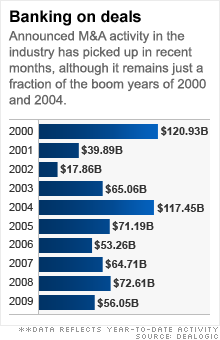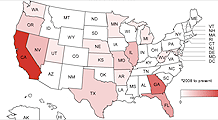Big banks in no rush to pair up
Despite a recent flurry of small deals, experts don't think major banks will merge anytime soon. And with so many cheap failed banks to buy, why should they?
NEW YORK (CNNMoney.com) -- The days of big bank mergers are gone. And it may be a long time before they ever come back.
Even though there has been a flurry of small bank deals in the past few weeks, takeover activity in the sector is at a depressed level. So far this year, a little more than $56 billion in deals have been announced within the commercial and investment banking universe, according to research firm Dealogic.
That's slightly lower than the totals from the same periods a year ago and in 2007. It is also way below the pace set in 2004 when such major tie-ups as JPMorgan Chase's (JPM, Fortune 500) $57 billion bid for Bank One and the nearly $15 billion purchase of SouthTrust by Wachovia, which was subsequently acquired by Wells Fargo (WFC, Fortune 500) last year.
For the most part, lenders still remain reluctant to trust what is on each other's books, according to experts. That's particularly true among regional and community banks that hold billions of dollars worth of commercial real estate loans, some of which are now at risk of going bad.
Banks with between $100 million and $10 billion in assets have almost $900 billion of commercial real estate exposure, according to recent estimates by real estate research firm Foresight Analytics.
"There is a significant hesitancy about buying something that is so beat up it infects the acquirer," said Hunton & Williams attorney Peter Weinstock, who specializes in bank mergers.
The few deals that have crystallized lately, note experts, have happened because the selling bank is faced with a long and possibly painful recovery.
Just last week, Chicago-based Downers Grove National agreed to sell itself to neighboring Diamond Bank for an undisclosed amount, reportedly as a means of raising capital.
A day earlier, Pennsylvania lender First Keystone Financial (FKFS) agreed to merge its eight branches with neighboring competitor Bryn Mawr Bank (BMTC) after struggling to turn a profit over the past year.
"This was a company that was not in a position to grow or recover sharply," said Jason O'Donnell, a senior research analyst at Boenning & Scattergood, who tracks the two companies. "This could be a good proxy for what is to come."
Unlike last year, many of the more notable bank mergers in 2009 have taken place following bank failures. BB&T (BBT, Fortune 500) acquired the failed Alabama lender Colonial BancGroup, for example, while Spanish bank BBVA bought Texas-based Guaranty Financial after the FDIC seized Guaranty.
Lenders have been intensely interested in buying the assets and deposits of failed competitors on the cheap as a way to grow, rather than pay up for a more viable rival. Regulators have also sweetened the terms for failed banks in recent months by agreeing to shoulder a portion of any future losses.
And with many more bank failures expected well past 2010, some ambitious lenders have quietly remained on the sidelines in the hopes they can buy a rival before long.
However, the pool of bidders for failed banks has grown increasingly crowded, said Stephen Skaggs, president of Bank Advisory Group, an Austin, Texas-based consultancy. That could complicate matters, leading to more deals for banks before they fail.
Big national lenders like U.S. Bancorp (USB, Fortune 500) as well as cash-rich private equity firms are all competing for failed institutions. So some smaller banks looking to grow may choose to do deals for troubled banks sooner rather than later.
"They feel they would rather make an offer at a fire-sale price, rather than bet on the bank failing and not being able to win the FDIC bid," said Skaggs.
Should more lenders consider mergers without the safety net of the government, expect buyers to take plenty of precautions. Some acquisitive banks are using creative and complex transaction agreements to insulate themselves.
Escrows, for example, have been one popular option. Under such an arrangement, the purchasing bank pays a little bit upfront and promises to sweeten the deal should the seller's questionable loans hold up as much as they promised.
"That is a very workable solution where it is a buyer's, not a seller's market," said Skaggs.
Still, while the time may be right for smaller banks to do deals, it will likely take an economic U-turn before mega bank mergers return. Almost all of the recent periods of frenzied deal activity, including 1998, 2000 and 2004, took place when the economy was growing robustly, unemployment was low and stocks were soaring.
Judging by the current state of affairs, those days have not returned just yet. ![]()



